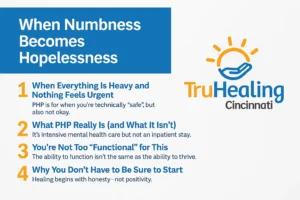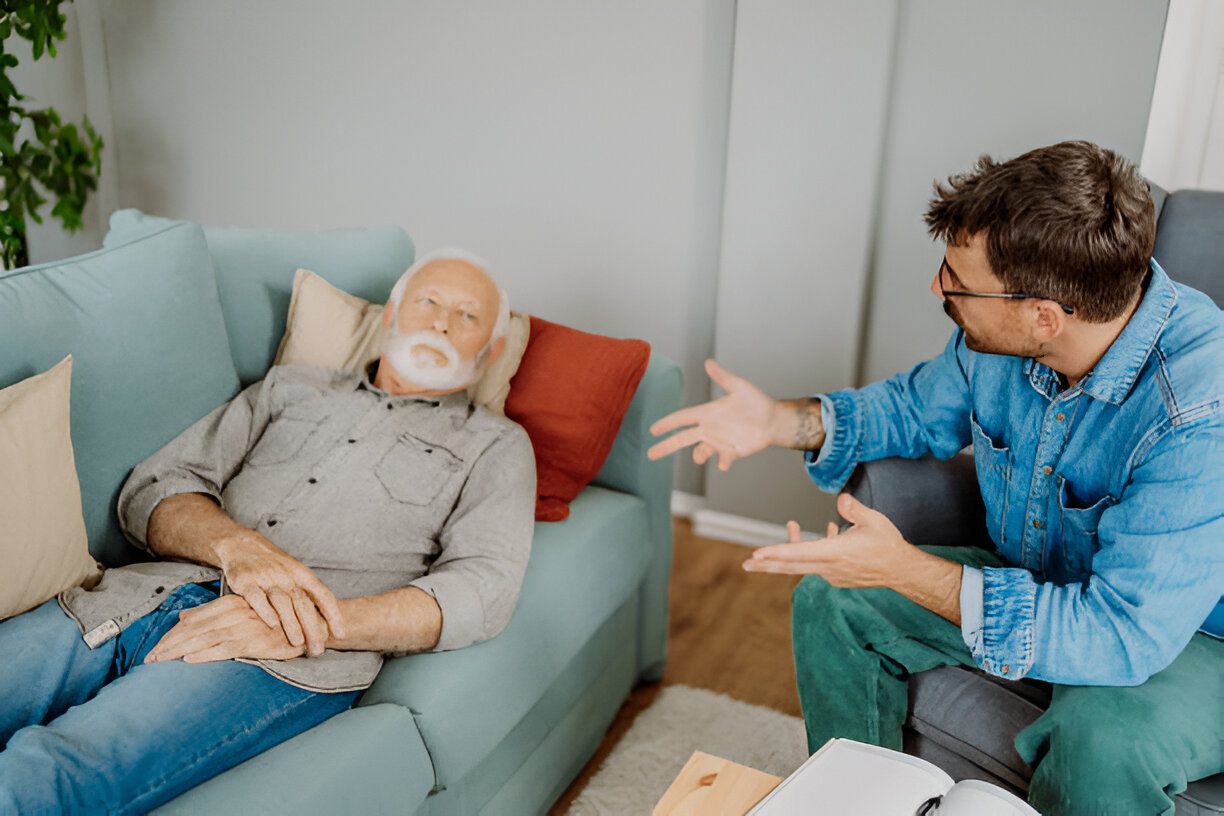You might not remember the last time you felt something fully.
Joy. Safety. Rest. A sense that things might one day get better.
Instead, you move through your day with a kind of numb ache. Not loud enough to scream. Not sharp enough to bleed. But always there.
That ache starts to whisper lies:
“This is just how life is now.”
“You’ve already tried everything.”
“You’re too much, or not enough.”
“Maybe disappearing wouldn’t be so bad.”
But the truth underneath all that noise? You don’t actually want to die.
You just want the pain to stop.
And that’s why PHP at TruHealing Cincinnati exists—not for people who are broken beyond repair, but for those who feel stuck in a kind of silent collapse. You don’t need a dramatic crisis to ask for help. You just need to be done pretending it doesn’t hurt.
When Everything Is Heavy and Nothing Feels Urgent
People talk a lot about suicidal ideation like it’s always dramatic—locked doors, frantic texts, visible scars. But for many, it’s more like this:
- You’re driving and wonder what would happen if you just kept going.
- You fall asleep hoping you don’t wake up—but not doing anything to make that happen.
- You cancel plans not because you’re busy, but because you can’t fake energy anymore.
- You can’t cry, but you can’t feel joy either.
This isn’t a momentary sadness. It’s a kind of shutdown. A freeze. A chronic disconnection that tells you this is how it’s always going to be.
PHP is for exactly this stage—where your nervous system isn’t in panic, but it’s not in peace either. Where you’re technically “safe,” but also not okay.

What PHP Really Is (and What It Isn’t)
PHP stands for Partial Hospitalization Program—but don’t let the name fool you. It’s not an inpatient psychiatric unit. You don’t live at the facility. You don’t give up your phone. You don’t lose access to your life.
Instead, PHP is an intensive, weekday mental health program designed for people who need more than a weekly therapy session—but don’t need a 24/7 hospital stay.
At TruHealing Cincinnati, PHP looks like this:
- Structured 5-day-per-week care (typically Monday through Friday)
- Individual and group therapy that meets you where you actually are—not where you “should be”
- Psychiatric support to evaluate and adjust any medications, if needed
- Trauma-informed clinicians who know that emotional numbness is a survival response, not a defect
- A community of people who also know what it’s like to look “fine” but feel empty
You return home each night. You eat your meals outside of the center. You still have access to your life—you’re just no longer trying to survive it without support.
You’re Not Too “Functional” for This
One of the most common reasons people delay seeking help is because they don’t think they’re “sick enough.” If you’re still getting to work, still managing your home, still checking boxes, it’s easy to convince yourself you should be fine.
But here’s the truth:
The ability to function isn’t the same as the ability to thrive.
You can go through all the motions while silently unraveling. You can be everyone else’s support system while your own is running on fumes.
PHP gives you a place to stop over-performing and start healing. You don’t need to prove how bad things are to deserve help.
If you’re located near Lawrenceburg or Lexington, Kentucky, we also provide care in those regions—because everyone deserves access to a reset point.
When Hopelessness Feels Like Truth
Hopelessness doesn’t feel like an emotion. It feels like a fact. Like gravity.
And when you’ve lived with it long enough, it convinces you that nothing could possibly change.
But hopelessness is a symptom—not a prophecy.
PHP helps you recognize this by slowing everything down. It removes the daily performance. It clears space for the questions you’ve been avoiding. It offers room for you to just be—tired, scared, angry, numb—and still be welcome.
This is where the shift begins. Not from positivity, but from presence.
Why You Don’t Have to Be Sure to Start
You might not be sold on this yet.
You might not believe anything can help.
You might think, “Sure, it helps other people. But not me.”
That’s okay.
You don’t have to be confident to call. You just have to be curious.
That tiny part of you—the one that clicked this blog and kept reading despite everything? That’s the part we’ll work with.
We don’t expect you to show up certain. We expect you to show up real.
What You Might Feel in the First Week
Honesty time: The first few days of PHP might feel strange.
You’re not used to sitting still.
You’re not used to being asked how you really feel—and being given time to answer.
You’re not used to being in a room where people don’t expect you to smile your way through the pain.
But you’ll also feel this:
- Someone will say something you’ve never been able to say yourself—but it hits.
- You’ll realize you’re not the only one who’s been “fine” and falling apart.
- You’ll finally exhale after years of emotional breath-holding.
The process isn’t instant. But it is honest. And honesty, when you’ve been pretending for years, is powerful.
What Clients Say After PHP
“I didn’t want to end my life. But I also didn’t know how to live anymore. PHP was the space between those two things—and it saved me.”
— PHP Client, 2023
“It wasn’t sunshine and rainbows. It was the first time I didn’t feel like a burden in a room.”
— PHP Graduate, 2022
“I thought I was too ‘normal’ for this kind of program. Turns out, I was exactly who it was for.”
— PHP Client, 2024
FAQ: What You Might Be Afraid to Ask
Is PHP the same as a psych ward?
No. PHP is outpatient. You go home every night. You keep your phone. You aren’t isolated or restrained. It’s therapeutic care in a safe, structured environment.
Do I have to be suicidal to qualify for PHP?
No. Many people enter PHP because they feel emotionally numb, exhausted, overwhelmed, or disconnected—not necessarily actively suicidal.
What if I’m already in therapy?
That’s okay. PHP offers a different level of intensity. Many clients pause weekly therapy while in PHP, then resume once their foundation feels stronger.
Can I still work while in PHP?
PHP is typically a daytime commitment (around 6 hours per day), so full-time work is often paused. But this pause is temporary—and worth it.
Will I be with people way worse off than me?
You’ll be with people like you—some high-functioning, some in crisis, all real humans trying to find their way back to themselves.
What happens after PHP?
Many clients step down to IOP (Intensive Outpatient Program), then to weekly therapy. We’ll help build a customized plan based on your needs.
If You’re Still Reading, You’re Not Done Yet
You might not believe in healing yet. But some part of you—however small—believes in something. That it might be possible. That this doesn’t have to be the rest of your story.
That’s enough to take the next step.
You don’t need to be hopeful. You don’t need to be certain. You just need to be tired of feeling this way, and open to something else.
We’ll meet you there.
If you’re waiting for permission to ask for help, this is it.
Call (888) 643-9118 to learn more about our Partial Hospitalization Program services in Cincinnati, Ohio.

